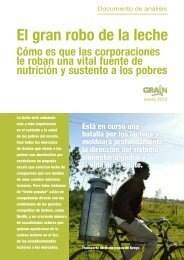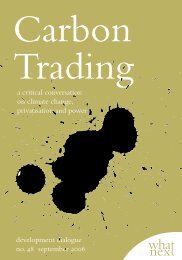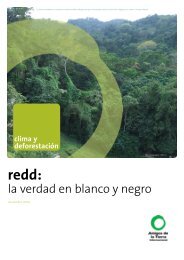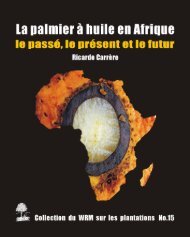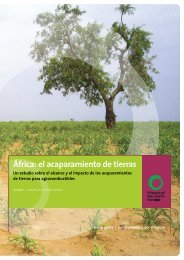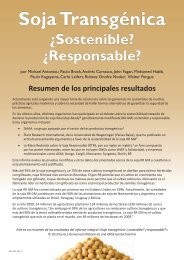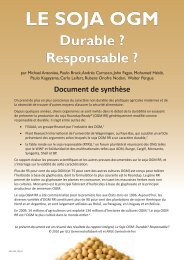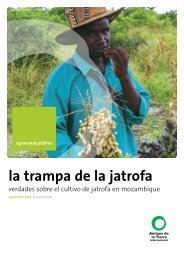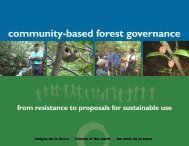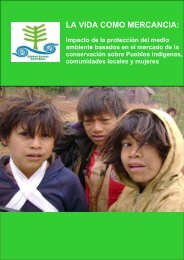Plantations, poverty and power - Critical Information Collective
Plantations, poverty and power - Critical Information Collective
Plantations, poverty and power - Critical Information Collective
You also want an ePaper? Increase the reach of your titles
YUMPU automatically turns print PDFs into web optimized ePapers that Google loves.
68<br />
Botnia, of course, denies the impacts <strong>and</strong> issues statements such as this:<br />
“All of Forestal Oriental’s plantations have received FSC certification<br />
There are no rain forests in Uruguay<br />
Only planted eucalyptus is used for pulp production” 339<br />
What Botnia does not mention is that the consultants responsible for the IFC studies <strong>and</strong> the FSC<br />
assessment (carried out by SGS Qualifor) failed to listen to what rural people are saying about the<br />
plantations. In its EIA, Botnia didn’t even look at the plantations. IFC’s Cumulative Impact Study notes<br />
that: “The EIA Study prepared by Botnia did not address specific impacts relating to plantations.” 340<br />
While IFC noted this omission, it did nothing to remedy it.<br />
IFC’s consultants point out that Forestal Oriental knows that its fast growing tree plantations have an<br />
impact on stream flows. In 2000, Forestal Oriental hired a South African consulting firm, CSIR Division<br />
of Water in South Africa, which found that Forestal Oriental’s eucalyptus plantations resulted in reduced<br />
stream flows by an average of around 25 per cent. Nevertheless, the study concluded that as long as the<br />
plantations did not cover too large an area in a given watershed the impact should not be a problem.<br />
Whether CSIR spoke to any local people about the problems is not documented in IFC’s <strong>Plantations</strong><br />
Annex. IFC’s consultants make no mention of any discussions with local people. 341<br />
While FSC certification should include taking local people’s problems into consideration, SGS failed to<br />
do so. Even when its assessors talked to local people SGS avoided dealing with what they told them. One<br />
villager told SGS that “the eucalyptus plantations consume a lot of water that in the long term can affect<br />
neighbouring populations.” SGS’s response was to explain that “The area is subject to prolonged<br />
droughts affecting the water table,” <strong>and</strong> that Forestal Oriental is carrying out a study into the impacts of<br />
plantations on water.<br />
In April 2006, World Rainforest Movement published a study written by Ricardo Carrere. The study is<br />
based on a visit to the plantation areas by a team of WRM researchers <strong>and</strong> interviews with the people<br />
living there. 342<br />
Residents of Algorta (Río Negro), told WRM’s researchers that “because of the eucalyptus trees the<br />
Arroyo Negro stream dried up, it used to be the town beach.” Forestal Oriental, Botnia’s plantations<br />
company, owns plantations in this area.<br />
A farmer in Guichón whose l<strong>and</strong> is now surrounded by plantations owned by Forestal Oriental,<br />
complained that as a result of the plantations the Boyado stream, which runs though his farm, has<br />
completely dried up.<br />
SGS’s public summary of their assessment of Forestal Oriental’s plantations fails to deal with the impacts<br />
339 “Botnia’s Fray Bentos pulp mill project”, Botnia, Company presentation, May 2007.<br />
340 “Annex B: <strong>Plantations</strong>”, International Finance Corporation Cumulative Impact Study, prepared by Ecometrix<br />
Incoporated, September 2006. http://www.ifc.org/ifcext/lac.nsf/Content/Uruguay_Pulp_Mills_CIS_Final<br />
341 “Annex B: <strong>Plantations</strong>”, International Finance Corporation Cumulative Impact Study, prepared by Ecometrix<br />
Incoporated, September 2006. http://www.ifc.org/ifcext/lac.nsf/Content/Uruguay_Pulp_Mills_CIS_Final<br />
342 Ricardo Carrere (2006) “GREENWASH: <strong>Critical</strong> analysis of FSC certification of industrial tree monocultures in<br />
Uruguay”, World Rainforest Movement, April 2006. http://www.wrm.org.uy/countries/Uruguay/book.html



